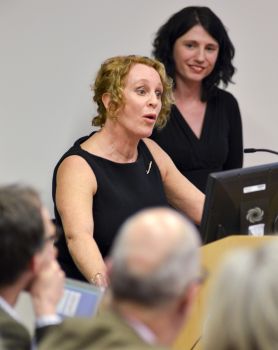Philippa fills the historical gaps
Posted on behalf of: History
Last updated: Thursday, 29 November 2012

Dr Claire Langhamer, Senior Lecturer in History, listened intently as historical novelist Philippa Gregory argued that history needs to be more than a record of events.
Best-selling historical novelist and Sussex alumna Philippa Gregory revealed to a University of Sussex audience this week how she “fills the gaps” in historical accounts.
Philippa, whose many books include The Other Boleyn Girl and The White Queen, spoke as a guest of the History department on Wednesday (28 November).
She told the packed gathering of students, staff and guests that history needs to be more than a record of events. “Archives are not history. The trouble with archives is that the material is often random and atypical. To have history, you have to have a narrative.”
She said that, as a novelist, she wants to understand the feelings of a character in any situation. This is how she is able to imagine links between historical events. “Fiction is about imagined feelings and thoughts. History depends on the outer life. The novel is always about the inner life. Fiction can sometimes do more than history. It can fill the gaps.”
While refusing to be drawn into discussing the forthright historian David Starkey (“It is never wise to say unkind things about him in public”), she pointed out that historians are now turning to an “unfolding narrative” to capture the drama of history and to engage audiences.
Philippa, who gained a BA in History at Sussex and went on to take a PhD at Edinburgh University in 18th-century literature, also berated historians of the past for being mostly men who write about men for men – therefore bypassing women’s stories.
She admitted that her interests, particularly in writing about little-known female figures such as Anne Boleyn’s sister Mary, are driven by her own prejudices.
“I write about women became I am interested in them and because historic women have direct parallels with today’s women when it comes to sexual abuse, invisibility and domestic violence. I like to explore these conflicts where they exist.”
In response to questions from the audience, she said that she never writes in dialect as she doesn’t like how it looks on the page. And, even though she uses modern language, she is careful not to use modern metaphors. The Tudors didn’t understand about the body’s circulatory system so she avoids her characters talking about blood coursing through veins to describe emotion.
In giving the vote of thanks, the Head of the School of History, Art History and Philosophy, Professor Matthew Cragoe, praised her novels for “creating a usable past for people who have never looked at a history book”. He added that he hopes she will in the future write a book about writing history, saying: “That would be a really fascinating read.”

